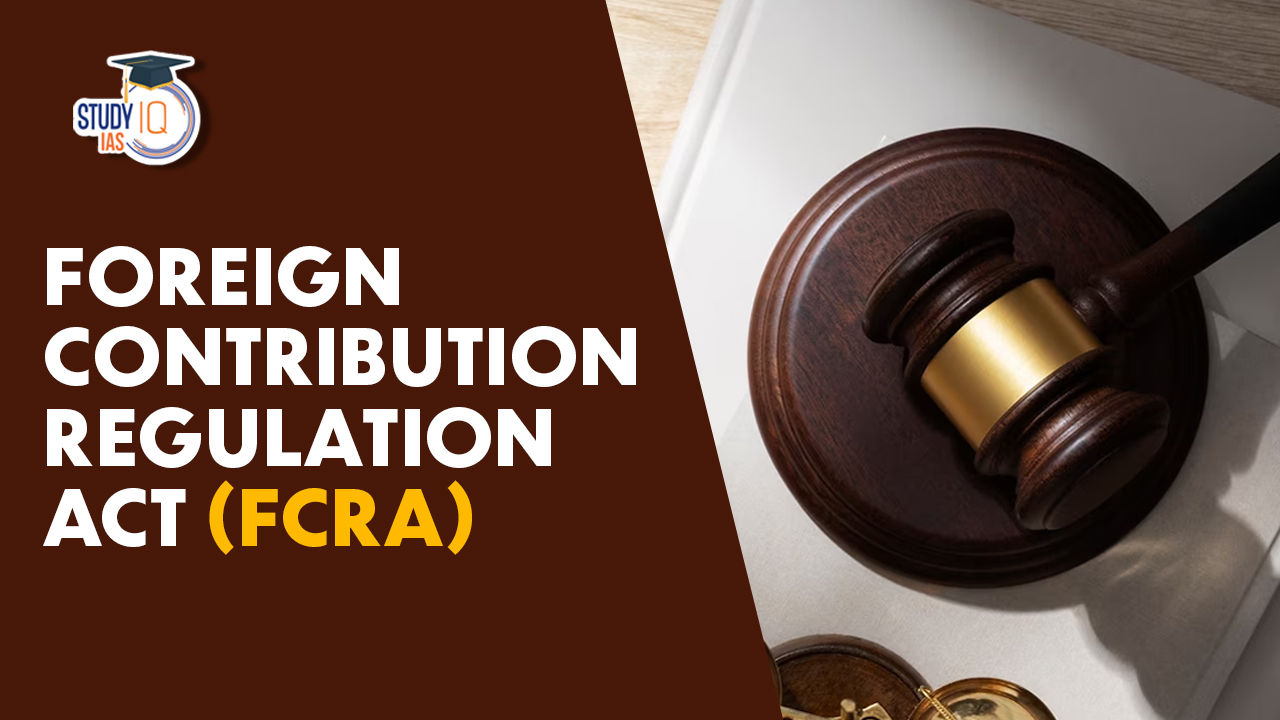Table of Contents
Context: Recently the Ministry of Home Affairs has issued updated rules regarding the acceptance of foreign funds under the Foreign Contribution Regulation Act (FCRA). This article aims to provide an in-depth understanding of the FCRA, its key provisions, registration criteria, exceptions, validity, and the impact it has on organizations and individuals receiving foreign donations.
Foreign Contribution Regulation Act (FCRA)
The Foreign Contribution Regulation Act (FCRA) was enacted in 1976 during the Emergency period in India. Its purpose was to regulate foreign donations received by individuals and associations to ensure they operate in a manner consistent with the values of a sovereign democratic republic. Over the years, the FCRA has undergone amendments to consolidate the law and tighten control over the receipt and utilization of foreign funds.
- Contributions made by Non-Resident Indians (NRI) from their personal savings through normal banking channels are not treated as foreign contributions under FCRA.
- The Ministry of Home Affairs (MHA) implements FCRA.
- 2020 Amendment in Foreign Contribution Regulation Act (FCRA): Introduced restrictions on fund transfers, reduced administrative expense allowance from 50% to 20%, and mandated a specific SBI branch in New Delhi for foreign fund receipts.
| About the latest amendment in rules |
|
Foreign Contribution Regulation Act (FCRA) Background
Foreign Contribution Regulation Act (FCRA) was introduced due to concerns about foreign interference in India’s affairs through independent organizations funded by foreign powers. In 2010, the FCRA was amended to consolidate the law on the utilization of foreign funds and to prohibit their use for activities detrimental to the national interest. In 2020, further amendments were made to give the government tighter control and scrutiny over foreign contributions received by non-governmental organizations (NGOs).
FCRA Objectives
- It requires every person or NGO wishing to receive foreign donations to be registered under the Act, to open a bank account for the receipt of the foreign funds and to utilise those funds only for the purpose for which they have been received and as stipulated in the Act.
- The Act prohibits the receipt of foreign funds by candidates for elections, journalists or newspaper and media broadcast companies, judges and government servants, members of the legislature and political parties or their office-bearers, and organisations of a political nature.
Foreign Contribution (Regulation) Amendment Act, 2020
The Foreign Contribution (Regulation) Amendment Act regulates the acceptance and utilization of foreign contributions by individuals, associations and companies. Foreign contribution is the donation or transfer of any currency, security or article (of beyond a specified value) by a foreign source.
FCRA Registration Criteria
To receive foreign donations, individuals or NGOs must fulfil specific criteria outlined in the FCRA. These criteria include:
| Criteria | Details |
| Registration under the Act | Every person or NGO seeking foreign donations must be registered under the FCRA. |
| Bank account in State Bank of India, Delhi | A dedicated bank account in the State Bank of India, Delhi, must be opened to receive foreign funds. |
| Utilization of funds: | Foreign contributions must be utilized solely for the purpose for which they were received and as stipulated in the FCRA. |
| Definite programs | FCRA registrations are granted to individuals or associations with definite cultural, economic, educational, religious, and social programs. |
FCRA Exceptions and Prohibitions
The FCRA outlines exceptions and prohibitions regarding the receipt of foreign funds. These include:
- Prohibited Categories: Foreign donations are not permitted for candidates during elections, journalists, media broadcast companies, judges, government servants, members of the legislature, political parties or their office-bearers, and organizations of a political nature.
- Eligibility Criteria: Applicants must not be fictitious, prosecuted for conversion activities, involved in creating communal tension or disharmony, or engaged in the propagation of sedition.
FCRA Account
- Foreign contributions must be received only in an account designated by the bank as an “FCRA account” in such a branch of the State Bank of India, New Delhi, as notified by the central government.
- No funds other than the foreign contribution should be received or deposited in this account.
- The person may open another FCRA account in any scheduled bank of their choice for keeping or utilizing the received contribution.
FCRA Validity and Renewal
FCRA registration is valid for a period of five years. NGOs are required to apply for renewal within six months of the registration’s expiry date. The government has the authority to cancel the FCRA registration of an NGO if it violates the Act, fails to engage in reasonable activities in its chosen field for two consecutive years, or becomes defunct. Once the registration is cancelled, the NGO is ineligible for re-registration for three years.
Suspension of Registration
- Earlier governments may suspend the registration of a person for a period not exceeding 180 days.
- The Act adds that such suspension may be extended up to an additional 180 days.
- The Union government reserves the right to cancel the FCRA registration of any NGO if it finds it to violate the Act.
- Registration of the NGO can be cancelled for a range of reasons. Once the registration is cancelled, it is not eligible for re-registration for three years.
- All orders of the government can be challenged in the High Court.
Key Amendments
- 2010 Amendment: Strengthened regulations on acceptance and use of foreign contributions, emphasising national interest protection.
- 2020 Amendment: Introduced restrictions on fund transfers, reduced administrative expense allowance from 50% to 20%, and mandated a specific SBI branch in New Delhi for foreign fund receipts.
Prohibited Activities
- Bans fictitious or deceptive entities.
- Forbids involvement in religious conversions and activities causing communal unrest or sedition.
- Restricts certain individuals and organisations, including political entities and government officials, from receiving foreign funds.
FCRA 2022 Rules Update
- Expanded the list of compoundable offences and increased the foreign contribution limit from relatives without government notification to Rs 10 lakh.
- Extended the deadline for notifying the government about new bank accounts.
Implications of FCRA
The Foreign Contribution Regulation Act (FCRA) has significant implications for organizations and individuals receiving foreign donations. While it aims to regulate foreign contributions and ensure transparency, certain concerns have been raised regarding the implementation and potential challenges faced by NGOs. The FCRA’s provisions require compliance, proper utilization of funds, maintenance of records, and submission of annual returns. Organizations and individuals must navigate these requirements to maintain their FCRA registration and continue receiving foreign donations.
The Foreign Contribution (Regulation) Act (FCRA) plays a crucial role in regulating foreign donations in India. Its objectives are to ensure the utilization of foreign funds for legitimate purposes, prevent activities detrimental to the national interest, and maintain transparency and accountability.
The FCRA’s provisions, registration criteria, exceptions, and compliance requirements help to establish a framework that governs the receipt and utilization of foreign contributions. While the FCRA supports the regulation of foreign funds, ongoing efforts are needed to strike a balance between regulatory compliance and enabling the effective functioning of non-profit organizations for the betterment of society.
Recent Issues Related to Foreign Contribution Regulation Act (FCRA)
- The Centre recently suspended the Foreign Contribution Regulation Act (FCRA) license of the Centre for Policy Research (CPR).
- The Union Home Ministry suspended the licenses of some NGOs that were alleged to have used foreign contributions for religious conversion. Several international and well-known NGOs such as Compassion International, Greenpeace India, Sabrang Trust, Lawyers’ Collective, Amnesty International, and Ford Foundation have come under the government’s scanner for alleged violations of FCRA.
- The Supreme Court (SC) upheld the constitutional validity of the Foreign Contribution Regulation Amendment Act (FCRA), 2020. It held that receiving foreign donations cannot be an absolute right and can be regulated by the Parliament.
- The PM CARES Fund received an exemption from all provisions of the Foreign Contribution (Regulation) Act.
Foreign Contribution Regulation Act UPSC
The Foreign Contribution (Regulation) Act (FCRA) is an important topic for the UPSC exam as it falls under the domain of governance and polity. Understanding the provisions, amendments, and implications of the FCRA is crucial for aspirants preparing for the UPSC exam, as it is a part of the UPSC Syllabus. Knowledge of the FCRA is vital to comprehend the legal framework governing foreign donations and their utilization by individuals and associations in India. Aspirants can take help from resources like UPSC Online Coaching and UPSC Mock Test to cover such topics comprehensively.
| Related Articles | |
| NEER and REER | Tax System in India |
| Direct Benefit Transfer | FERA and FEMA |


 Nilgiri Biosphere Reserve, Map, Climate,...
Nilgiri Biosphere Reserve, Map, Climate,...
 Growth in Gold Loans and NPAs, Reasons a...
Growth in Gold Loans and NPAs, Reasons a...
 How RBI Responded To Global Trade War Ch...
How RBI Responded To Global Trade War Ch...





















